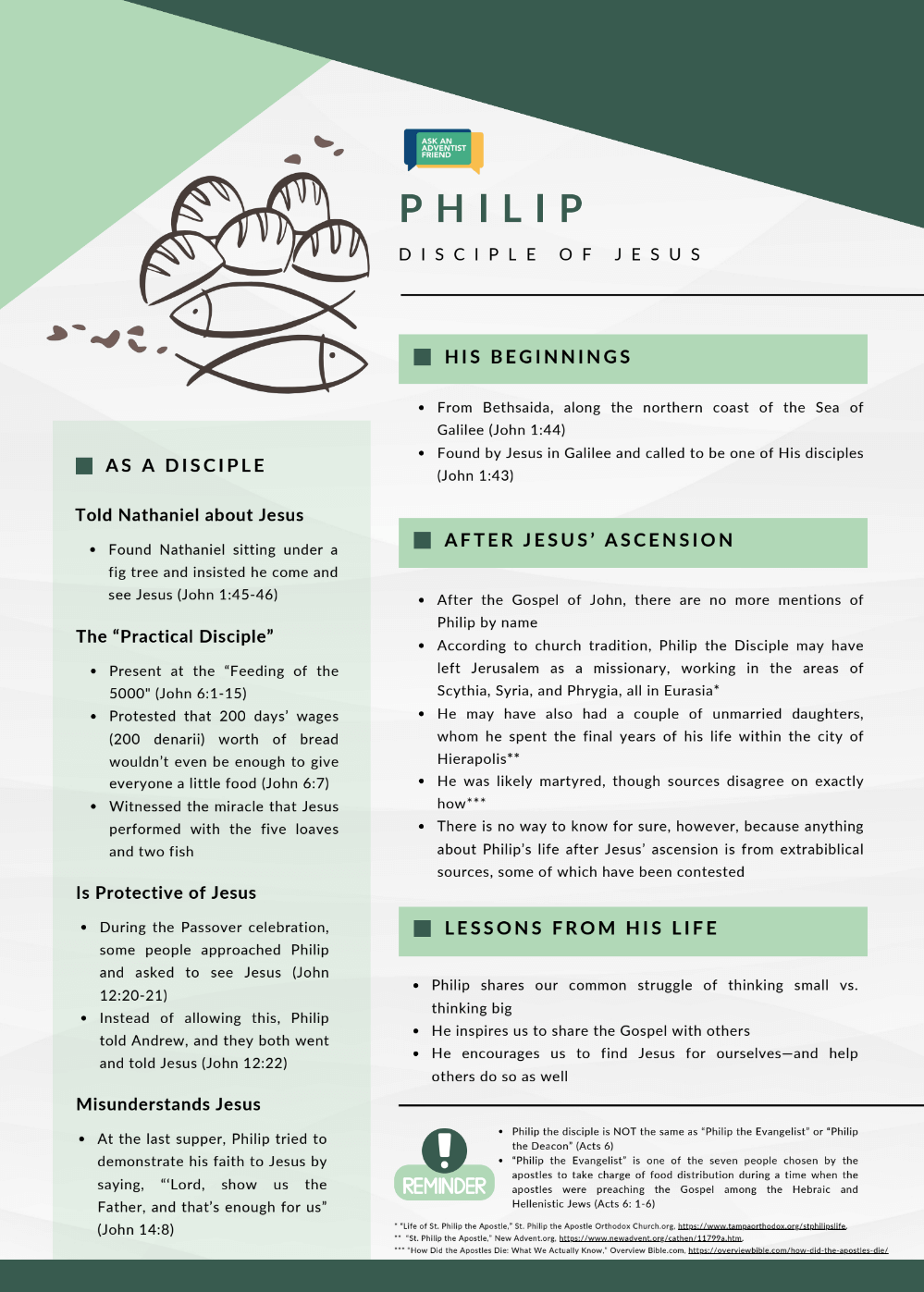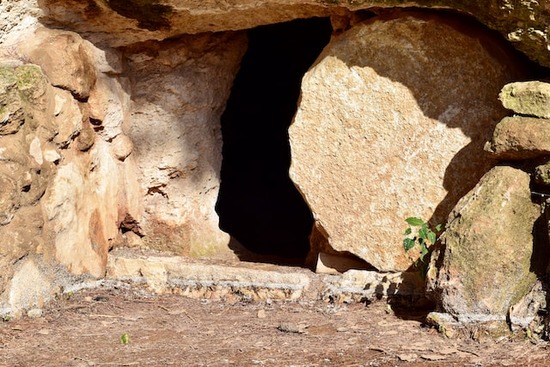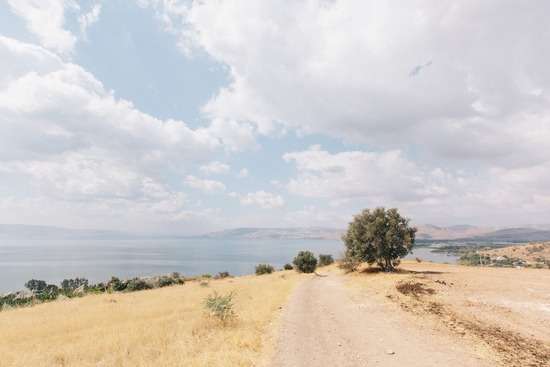Who Was Philip the Disciple In the Bible?
 Philip was one of the 12 disciples called by Jesus Christ during His earthly ministry. He was originally from the city of Bethsaida and to this day is often known as the “practical disciple.”
Philip was one of the 12 disciples called by Jesus Christ during His earthly ministry. He was originally from the city of Bethsaida and to this day is often known as the “practical disciple.”
He was also instrumental in the call of Nathanael, another one of Jesus’ disciples.
Most of what we know about Philip comes from the book of John. And while he may not be as well known as some of the others, there’s still a lot we can learn from his time following Jesus.
We’ll cover:
We’ll start with Philip’s life before he was called to be a disciple of Jesus.
Philip’s beginnings

Photo by Chris Gallimore on Unsplash
Piecing together the details we can find in the New Testament, we know he lived in the village of Bethsaida (John 1:44), which sprawled out along the northern coast of the Sea of Galilee.1
Given that Bethsaida was also the hometown of two more of Jesus’ disciples (Peter and Andrew), it’s possible Philip knew them.
But it was in Galilee that Jesus found Philip and called him to become a disciple.
“The following day Jesus wanted to go to Galilee, and He found Philip and said to him, ‘Follow Me’” (John 1:43, NKJV).
And it isn’t long after accepting this call that we hear about his first significant act as a follower of Jesus.
Philip as a disciple
The synoptic Gospels—Matthew, Mark, and Luke2—only mention Philip within a list along with the other disciples of Jesus.
But the Gospel of John provides a few stories that feature Philip as a main character.
Telling another about Jesus

Photo by Johann Siemens on Unsplash
The first story involving Philip happens right after Jesus calls him to be a disciple, in John 1:45-51.
Philip found Nathanael (also called Bartholomew), who was sitting under a fig tree, and told him,
“‘We have found Him of whom Moses in the law, and also the prophets, wrote—Jesus of Nazareth, the son of Joseph’” (John 1:45, NKJV).
At first, Nathanael was a little skeptical. He countered,
“‘Can anything good come out of Nazareth?’” (John 1:46, NKJV).
But Philip was insistent. “‘Come and see’” (John 1:46, NKJV).
Nathanael came and saw, and discovered Jesus had already seen him and knew about him. Then Nathanael believed and also became a disciple.
So Philip wasted no time in telling others about Jesus and ended up adding to His group of disciples.
The “practical disciple”

Photo by Piotr Arnoldes
The next time Philip is featured in John’s narrative is in John 6:1-15. This passage is often recognized as the “feeding of the five thousand.”
But before that, the disciples were faced with thousands of hungry people and no food. All these people had been following Jesus, listening to Him speak and watching everything He did.
Jesus already knew the miracle He would perform, but He tested Philip by asking him where they would buy enough bread for everyone.
Philip had quickly done the math, and protested,
“‘Two hundred denarii worth of bread is not sufficient for them, that every one of them may have a little’” (John 6:7, NKJV).
To put this in perspective, a denarius was one day’s wages at that time (Matthew 20:2). So you can imagine how pragmatic Philip’s eyes must have widened at the thought of so much money. Where would they get it all?
Then Andrew came along with the boy who was willing to share five barley loaves and two fish, which Jesus used to perform the miracle.
Philip had not taken miraculous intervention into account when he tried to tally up how much food they would need and how much it would cost. His faith was still young, but he was privileged to get to grow his faith in the presence of Jesus and all the amazing things He did while He walked the earth.
Philip is protective of Jesus
After Jesus and His disciples had come into Jerusalem to celebrate Passover, we find Philip mentioned specifically in John 12:20-36.
Some people approached Philip, asking to see Jesus. Philip told Andrew instead, and the both of them went and told Jesus.
Jesus spoke to them about His approaching death on behalf of the whole world and these visitors aren’t mentioned again.
Why did these people come to Philip first, before Jesus? We don’t know for sure, but some scholars theorize that since Philip was not a full-blooded Jew and had a Greek name, perhaps he seemed more approachable.3
But looking at Philip’s response (and there’s no record that he ever went back to those Greeks to give them an answer), it’s possible he was acting as a bodyguard for Jesus.
See, Jesus had just raised Lazarus from the dead, which didn’t sit well with the Jewish leaders. They were so upset at this display of a miracle that they essentially put out a warrant for His arrest (John 11:47-57).
Undoubtedly, Jesus was aware of this, and so His disciples may have intercepted everyone wishing to see Him in order to filter out anyone looking to report Him.4
Whatever the case, Jesus answered Philip and Andrew by saying that His time had come. He would be glorified by the Father, and then He would be put to death. His earthly ministry was nearing its end. And then, the good news of His sacrificial death and His resurrection would reach even more people than if He prolonged His time walking among us as a human.
Philip misunderstands Jesus (“Show us the Father”)

Image by Gini George from Pixabay
The last story John tells about Philip is found in John 14:5-14.
Jesus and the disciples had finished the “Last Supper” in John 13. Judas Iscariot has just been revealed as the traitor, and he’s hastily departed. The disciples are asking Jesus questions, and Thomas asks how they can know where He’s going and how they can know the way.
Jesus replies,
“‘I am the way, the truth, and the life. No one comes to the Father except through Me. If you had known Me, you would have known My Father also; and from now on you know Him and have seen Him’” (John 14:6-7, NKJV).
Then Philip pipes up, in an attempt to demonstrate his faith.
“‘Lord, show us the Father, and that’s enough for us’” (John 14:8, CSB).
But he had missed the whole point of what Jesus was saying. Jesus was the Father, because God, Jesus, and the Holy Spirit are three beings in one.
Jesus reminds Philip to refocus:
“‘Have I been among you all this time and you do not know me, Philip? The one who has seen me has seen the Father. …’” (John 14:9, CSB).
He continues for several more verses, describing the attributes of Jesus and God the Father.
Like the other disciples, Philip had seen Jesus’ miracles and heard His preaching, but he was still figuring out just who Jesus was. He would have a sobering reminder in just a few hours.
Jesus would be captured by the authorities. And all the disciples, including Philip, would flee in terror. Then Jesus would be crucified the next day.
But though Jesus would be killed for all the sins of humanity, He would rise from the grave and eventually ascend into heaven, leaving His disciples to carry out His work on earth.
So what did Philip do with this incredible experience he had with Jesus? How did he spend the rest of his life?
Philip after Jesus’ ascension

Photo by Fr. Daniel Ciucci on Unsplash
Not much is known about Philip after Jesus returned to heaven and the disciples (now “apostles”) set out on their own paths of ministry. After the Gospel of John, there aren’t any more mentions of him by name.
But extrabiblical sources do provide us with some ideas about Philip’s later life:
- According to church tradition, Philip the Disciple may have left Jerusalem as a missionary, working in the areas of Scythia, Syria, and Phrygia, all in Eurasia.5
- He may have also had a couple of unmarried daughters, whom he spent the final years of his life with in the city of Hierapolis.6
- He was likely martyred, though sources disagree on exactly how.7
But we can’t know for sure because some of these stories come from contested extrabiblical accounts, like The Acts of Philip, compiled in the fourth century by an unknown person.8 And some early Christian writers got the Apostle Philip mixed up with another New Testament Philip.9
“Philip the Evangelist” is a different person than “Philip the Disciple”
This other New Testament Philip is referred to as “Philip the Evangelist” or sometimes “Philip the Deacon.” In Acts 6, Philip the Evangelist is listed as one of the seven people chosen by the apostles to take charge of food distribution, during a time when the apostles were preaching the Gospel among the Hebraic and Hellenistic Jews (verses 1-6).
Later, Paul and Luke stayed at Philip the Evangelist’s home in Caesarea (Acts 21:8). He had four daughters who were filled with the Holy Spirit and “prophesied” (Acts 21:9, CSB).
You can see how it could be easy to mix the two up, especially in a time before last names were consistently included in records.
Philip the Evangelist preached in Samaria (Acts 8:5) and was the one who was led by the Holy Spirit to approach the Ethiopian eunuch’s carriage and explain Isaiah to him (Acts 8:26-40).
But as for Philip the Disciple, while we don’t have definitive records of his accomplishments after Jesus ascended, it’s likely that he acted in the name of Jesus and benefited the early church.
What we can learn from Philip’s life

Photo by Hannah Busing on Unsplash
Even with only a few stories to draw from, we can still learn valuable lessons from the life of Philip the Disciple.
- He shares our common struggle of thinking small vs. thinking big
Philip was a practical man. He didn’t always think outside the box when it came to how Jesus would respond to various situations. But that also means he’s a lot like many of us. We can relate to his perspective and his thought processes.
And, even with his pragmatic ways, he always chose to trust Jesus. Even when it didn’t always make sense to him.
Similarly, we may not understand all of Scripture, and we may not understand why certain things are happening in our lives. But we can always trust that Jesus has our best interests at heart, and He promised that the Holy Spirit will guide us.
- He inspires us to share the gospel with others
Philip teaches us not to hesitate to tell others about Jesus.
One of the first things Philip did as Jesus’ newest disciple was to excitedly tell his friend Nathanael—that they’d found the one who was prophesied about in Scripture. And now they could find out what He’s like from experience.
Today, the good news of the gospel hasn’t changed. It’s Christ’s free gift of salvation for all who believe and follow, and we want others to meet Jesus and experience this joy and peace as well.
- He encourages us to find Jesus for ourselves—and help others do so as well
When Philip told Nathanael about Jesus, he didn’t preach a sermon at him. He simply came to him and said, “We’ve found Him!”
And Nathanael’s response may not have been what Philip expected.
“Can anything good come out of Nazareth?” (John 1:46, CSB).
But even with that, Philip didn’t start reciting proof-texts or start an impromptu Bible study to show Nathanael why he shouldn’t be hesitant. He didn’t present any type of spoken argument. He simply challenged him to find out for himself.
“‘…Come and see,’ Philip answered” (John 1:46, CSB).
There are times to tell people what we know, and there are times when the best course of action is to encourage others to see for themselves. The Holy Spirit can work through us either way.
Sometimes we don’t have all the answers to everyone’s questions or hesitations when it comes to their personal faith journey. And we don’t have to act like we do. But with Philip the Apostle as an example, we can always nudge others in the right direction and trust that God will be working on their hearts.
One of the biggest blessings of studying Jesus’ 12 disciples is that we get a small glimpse of what any one of us might have been like in those remarkable situations with the Son of God. All 12 had different personality quirks and tendencies that made their way into recorded history.
With Philip, the pragmatists among us can relate to the way he often responded to things.
And we can take courage in the fact that with each surprise or correction from Jesus, the results for Philip were always an increase of faith and a growth in perspective. Reading his story, as short as it may be, we can see a piece of ourselves in him as we learn more about just how amazing our Savior Jesus Christ truly is.
On that note, want to get to know even more about Jesus? Learn about His identity in the Godhead, as well as His ministry on earth.
Related pages
- “Bethsaida,” Bible Places [↵]
- Matthew 10:3, Mark 3:18, Luke 6:14. [↵]
- McArthur, John. Twelve Ordinary Men, p. 119 [↵]
- “John 12:21,” Bible Ref.com [↵]
- “Life of St. Philip the Apostle,” St. Philip the Apostle Orthodox Church.org [↵]
- “St. Philip the Apostle,” New Advent.org [↵]
- “How Did the Apostles Die: What We Actually Know,” Overview Bible.com [↵]
- “The Acts of Philip,” University of Groningen [↵]
- “St. Philip the Apostle,” New Advent.org [↵]
Questions about Adventists? Ask here!
Find answers to your questions about Seventh-day Adventists
More Answers
The Health Benefits of Fresh Air You Should Know About
The Health Benefits of Fresh Air You Should Know About“When you can’t breathe, nothing else matters,” the American Lung Association tells us. And while that’s true, the kind of air you’re breathing will determine the health benefits you experience. Breathing fresh...
What Do Seventh-day Adventists Choose to Eat?
What Do Seventh-day Adventists Choose to Eat?Food blogs overwhelm the internet; food fads are all the rage; and copycat and healthy versions of food are the subject of many a get-together. Eating—and eating the best way—is a big deal. And everybody has a different...
10 Incredible Ways Sunlight Can Improve Your Health
10 Incredible Ways Sunlight Can Improve Your HealthAre you concerned about sunlight’s negative effects? You might be the one who lathers on the sunscreen and covers up when you go outside. Or maybe you avoid being outside as much as possible. You might be surprised,...
Why Is Water So Important?
Why Is Water So Important?We all know that water is a substance we can’t live without. It quenches our thirst and keeps us hydrated on the inside. And it’s necessary for hygiene and cleansing on the outside too. But did you know that the cleansing properties of water...
Ellen White’s Writings and the Adventist Health Message
Seventh-day Adventists are known for their emphasis on healthy living. And Ellen G. White was a significant influence in the development of this priority and practice among Adventists.
Health Clinics
Ellen White and Adventist Healthcare—Ahead of Their Time Medical care in the mid-1800s was primitive, to say the least. Basic concepts we take for granted—such as proper handwashing or recognizing the dangers of bloodletting—were nonexistent. And doctors often had...
What Did Ellen White Teach about Vegetarianism?
What Did Ellen White Teach about Vegetarianism?One thing you might have heard about Seventh-day Adventists is their emphasis on a vegetarian lifestyle. If you’re wondering why that is, it goes back to our church’s humble beginnings: As Adventists studied the Bible,...
How Ellen White’s Teachings Can Improve Your Health
How Ellen White’s Teachings Can Improve Your Health Healthcare in the nineteenth century was said to leave “more disease than it took away” with its use of bloodletting and “medicines” like mercury and arsenic.1 As people questioned these methods, new approaches...
Change Your Perspective on Life with These 5 Mindsets
5 Biblical Mindsets to Change Your Life for the Better Sometimes, life is just plain hard. There’s no way around it. So would thinking about things differently really change anything? Our perspective on life, and everything it throws at us, affects more than we’re...
Bible Promises for When You’re Worried or Fearful
Bible Promises for When You’re Worried or Fearful The Bible is full of beautiful promises that can comfort us in a variety of situations. They can give us hope when we are hopeless, make us feel grateful for God’s love, and comfort us when we’re grieving or suffering....
12 Practical Ways to Overcome Worry
12 Practical Ways to Overcome Worry DISCLAIMER: This content is for informational purposes only. It does not constitute any professional medical advice and is not intended as a substitute for professional mental health therapy. It’s easy to get stuck in a cycle of...
How the Bible Talks About Worry, Fear, and Anxiety
How the Bible Talks About Worry, Fear, and Anxiety Worry and fear are the ingredients of anxiety. It’s easy to see how the world isn’t perfect—and the anticipation of a bad event or experience (that may or may not even happen) can end up draining the peace and...
How to Calm Anxious Thoughts, Using the Bible
How to Calm Anxious Thoughts, Using the Bible You were expecting a phone call from your daughter half an hour ago, and she still hasn’t called. She’s also not answering your calls. You feel your heart thumping as your thoughts race: What if she’s been in a car...
What You Should Know About the Adventist Health Studies
What You Should Know About the Adventist Health StudiesYou may have heard that Seventh-day Adventists care about health. But what you may not know is that Adventists have been the subjects of long-term research into lifestyle and health. Since 1958, researchers from...
Benefits of Sunlight
Yes, There Are Health Benefits of SunlightDespite the bad reputation it’s gotten, sunlight is generally associated with positivity, as shown by songs like “You Are My Sunshine,” or phrases that refer to delightful people as having a “sunny disposition.” There’s a...
Why Your Body Needs Rest for Optimal Health
Why Your Body Needs Rest for Optimal HealthStruggling to think straight? Wondering why you can’t remember that important tidbit you heard earlier today? Feeling like your emotions are about to explode? These are just some of the symptoms that can reveal your need for...
The Seventh-day Adventist Diet: One of Our Key Longevity Secrets
The Seventh-day Adventist Diet: One of Our Key Longevity SecretsOats, avocados, lentils, tofu—probably not what you first think of in a standard American diet. But if you show up at the home of an Adventist, chances are you may be served one of these staples. Out of a...
Why You Need Fresh Air
Why You Need Fresh Air“When you can’t breathe, nothing else matters,” the American Lung Association tells us. We couldn’t agree more! Breathing in clean air is an essential part of caring for our bodies, which God has given us. Together with other health principles,...
Sabbath Meal
Everything You Need to Know About Sabbath MealsFor Seventh-day Adventists, sharing a Sabbath meal with friends and family is one of the most special and memorable parts of the Sabbath. That’s why we want to share with you all about Sabbath meals and why they’re such a...
Adventists and Healthy Living
Adventists and Healthy LivingWhat’s the Adventist “Health Message” All About? One thing Seventh-day Adventists are known for is their emphasis on living healthy lives. Since our bodies are living temples of the Holy Spirit (1 Corinthians 6:19, 20), we strive to stay...
Water’s Importance—Physical Benefits and Spiritual Applications
Water’s Importance—Physical Benefits and Spiritual Applications We all know that water is a substance we can’t live without. Not only does it quench our thirst and keep us hydrated from the inside, but it’s necessary for hygiene and cleansing on the outside as well....
How Important is a “Day of Rest?”
How Important is a “Day of Rest?” Why God Created a Day for Downtime by Martin Casper Do you ever experience the feeling of complete overload? Do you feel like the only way you can get ahead is by slamming it 24/7? I hear these types of comments more and more...
7 Reasons Why a Day of Rest is Important
7 Reasons Why a Day of Rest is ImportantWe live in a fast-paced world. It seems as if success is measured in how much you can do in a short amount of time. (Extra points for the service or product that is available 24/7). The idea that we will be more successful if we...
How do Adventists choose what to eat?
How do Adventists choose what to eat?Every day, parents go through the ritual of getting their kids to eat what is healthy and good while trying to steer them away from what can hinder the growth of their developing bodies. Nutritionists work with their clients to...
How Can I Have a Better Marriage?
Is it possible to have a happy marriage?
How do Adventists make movie and music choices?
How do Adventists make movie and music choices?Cinema has come a long way since the first clips of motion pictures came to light in 1878. As the decades rolled on, film and music producers have created rivers of movies and albums for the masses. Today, watching movies...
Why are many Adventists Vegetarian?
Why are many Adventists Vegetarian?The diet intended for man is outlined in Genesis 1:29, “And God said, ‘See, I have given you every herb that yields seed which is on the face of all the earth, and every tree whose fruit yields seed; to you it shall be for food.’”...
Didn’t find your answer? Ask us!
We understand your concern of having questions but not knowing who to ask—we’ve felt it ourselves. When you’re ready to learn more about Adventists, send us a question! We know a thing or two about Adventists.
























